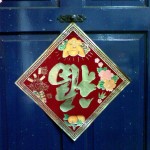#60 Get your Chinese New Year on – the basics you should know
 It’s Chinese New Year week – get your red out and pick up some fireworks at the roadside stands! I don’t know about you, but I’m ready for some quality family time and for the hustle and bustle of China to go quiet for a few days. (Well, minus the fireworks of course!) Why cover CNY in a ‘laowai’ podcast? Well, I believe that because this holiday is so vitally important to the core of our host nation, it is also incredibly important for us to learn about. They care, so we care. This week, I’m going to embark on a journey with you to try to uncover some of the mystery around China’s biggest holiday. Today’s episode covers the basics – the need to stop generalizing the entire population; the ingrained cultural importance of this holiday; why the color red; and finally, the significance of fireworks.
It’s Chinese New Year week – get your red out and pick up some fireworks at the roadside stands! I don’t know about you, but I’m ready for some quality family time and for the hustle and bustle of China to go quiet for a few days. (Well, minus the fireworks of course!) Why cover CNY in a ‘laowai’ podcast? Well, I believe that because this holiday is so vitally important to the core of our host nation, it is also incredibly important for us to learn about. They care, so we care. This week, I’m going to embark on a journey with you to try to uncover some of the mystery around China’s biggest holiday. Today’s episode covers the basics – the need to stop generalizing the entire population; the ingrained cultural importance of this holiday; why the color red; and finally, the significance of fireworks.
Describing what happens around China during the Chinese New Year is a bit like asking an American to describe what happens in an American home at Christmas.
Show Notes
“What’s Christmas like in the west?”
Describing what happens around China during the Chinese New Year is a bit like asking an American to describe what happens in an American home at Christmas. There are very, very general guidelines for different activities that take place, but nonetheless, if you ask any family what they eat, or where they go, or what they do to celebrate the Christmas season, you’ll get a plethora of varying responses. Be it ham, turkey, lamb, or take-out, a meal spent with family is generally important. How a family goes about opening presents may not important to distinguish, but there generally are presents involved. For some, church traditions run deep during the Advent season, yet for others, it will have no part to play. Each person’s unique experiences shape and inform how one spends this important day, and lumping each action and tradition into one bucket just doesn’t seem to do the holiday justice.
Get local
As foreigners in a land steeped in probably more tradition than we’re used to, it’s tempting to try to generalize how Chinese spend their most important festival season. Some of our Chinese friends, coworkers or neighbors may seem super traditional or superstitious, so from the outside is appears that they must spend each day just like the websites (or podcasts!) say they do. Well, I caution you against generalizing and taking this or any other resource as an end-all-be-all for everything you need to know about Chinese New Year. The secret of true insight lies within individuals.
It’s an ‘Ally’ thing
Here’s an example: I’ve been in China 10 years and just yesterday I chatted with a neighbor as she was coming home. She had what looked like 10 kilos of a gluttonous rice cake dessert thing that I’ve seen here and there. She insisted that we must eat it at Chinese New Year to usher in all of the blessings of the year to come. I’ll happily oblige because it’s delicious but in all of my years, in all of my dealings with friends and co-workers I’ve never seen one so adamant about the importance of this one thing. It’s a one off; it’s like me feeling incomplete without ham on Thanksgiving, when a turkey is just as yummy (and probably more traditional). Or, wanting shrimp cocktail on my birthday every year. There’s just something that seems amiss when it doesn’t happen. Those aren’t American things; they’re Ally things. And so today we are going to talk very generally about what you can expect and why this Spring Festival season but I encourage you to dive in, get local and experience it for yourself.
It’s Important, with a capital ‘I’
I haven’t been with extended family for Christmas in 10 years and while it’d be awesome, it certainly doesn’t affect my view of the flow and opportunity of my entire year ahead. Home is where Ron and I are and we are very happy to make due with that. That’s not so in China. I think the first thing to note is how crucial it seems for Chinese people to go home and spend time with their family. In a migrant nation such as China where, big cities are filled with workers from far away provinces, it is incredibly important to go ‘home’ at this time of year wherever home may be. Most Chinese work outrageously hard all year round and CNY is the only break many have to go home and see loved ones, oftentimes including spouses and children who were left in the hometown. Travel times may range from hours to days and so, many relish in the 7 consecutive days off and oftentimes request more if possible. Many weddings happen in hometowns during Chinese New Year as well because it’s convenient – everyone is already back home to celebrate.
To each their own
Now the necessity of traveling home doesn’t necessarily mean everyone loves it. Take my family’s ayi for instance. Yang actually can’t stand Chinese New Year time. She thinks that there’s too much pressure to spend loads of money on lavish gifts for family and friends, including spending excessively on meals. But she’s can’t NOT do it. That’s the thing. Tradition dictates her actions during this time and while her independent, I’ve-been-on-my-own-working-for-20-years-in-Shanghai-self would love to stay here and actually rest, she feels called to go home and get caught up in the hustle and bustle of the New Year festivities. She explained to me that because she’s the one that ‘got out’ and is making decent money in the big city, she feels a bit of extra pressure to spend, spend, spend and for a spend-thrift like Yang, this time of year kills her! So like I said up front, know the person, know the story! The fact of the matter for Yang, whether or not she felt external pressure to go home and play the game, the internal pressure to do so is way worse. For her, the success of her entire upcoming year sort of depends on her making this trip home and going through the traditions of Chinese New Year.
The basics
Traditionally, Chinese New Year, or Spring Festival was a time to honor gods and ancestors. It’s wildly celebrated in Chinese communities all over the world including obviously Mainland China, Hong Kong, Macau, Taiwan, Singapore, Thailand, Indonesia, Malaysia, Mauritius, Philippines, and Chinatowns all over the world. The biggest celebration outside of Mainland China is actually in the US, in San Francisco.
Within China, regional customs and traditions vary immensely but one thing is certain, the family dinner on the eve of the new year is super important, as is making sure your home is clean and in order before the 1st of the new year. Think of it as sweeping away any ill-fortune and making way for good luck to come in. Have you seen the long red ‘couplets’ hanging on neighbors’ doors? This is also the time when the old ones come down, and new ones, wishing the family, luck, health and fortune are pasted up. And we can’t overlook the importance of the ornate paper cutouts of the character ‘fu’ meaning good fortune. It’s often times pasted onto the door turned upside down. I used to think it was a mistake (shows you how high-and-mighty I used to be!), but no, it is a play on words. Dào (4th tone) can mean ‘upside-down’ or ‘to arrive’. By turning the character for fortune upside down, it’s calling lady luck to arrive at your door. And lastly, firecrackers carry immense importance as we’ll see in a minute and the culture surrounding the little red paper envelopes, or hóngbāo, is too extensive to cover here so we’ll get into detail there later in the week.
The dreaded beast

One depiction of Nian, the dreaded mythical beast that tormented the villagers on the first of the new year.
We’ll wrap up today with a story. Long, long ago, in a kingdom far, far away there was a village. And in this village lived peaceful people who started off each new year battling a mythical beast named ‘Nian’. Well, Nian was nasty and he’d come on the first day of the new year to eat livestock, crops and even villagers, especially children. As one means of protection, the villagers would leave food outside of their doors for Nian, thinking that if he got full on the peace offerings he wouldn’t attack the livestock or children. Here’s where the story diverges a bit depending on who you talk to, but one version says that Nian was scared away by a little kid wearing red and so the villagers learned that the beast feared this auspicious color. When the new year was imminent, the villagers would hang red, well, everywhere really – including lanterns and red scrolls on windows and doors. The other story camp says that it was the firecrackers that scared Nian away from the village hence the plethora of noise making that still continues on to this day.
Again, it’s important!
Regardless of where these traditions began, it’s very clear that the vast majority of the Chinese people today, whether they believe the tradition, or not, whether they want to fully participate or not, there’s something ingrained within them that makes Chinese New Year hands down the most important festival of the year chocked full of expectation and excitement about the year to come. So as laowai living in their nation, it makes sense to me to dig in and gain a bit of depth into the very basics of the pieces of Chinese culture that do influence our lives to some degree while we’re here and that’s just what we’re going to do this week! Tune in to hear about fireworks, hongbao, the art of gift-giving, what’s going to happen in the days of Spring Festival yet to come, a skimming the surface overview of numerology and what we can look forward to in the Year of the Sheep.



